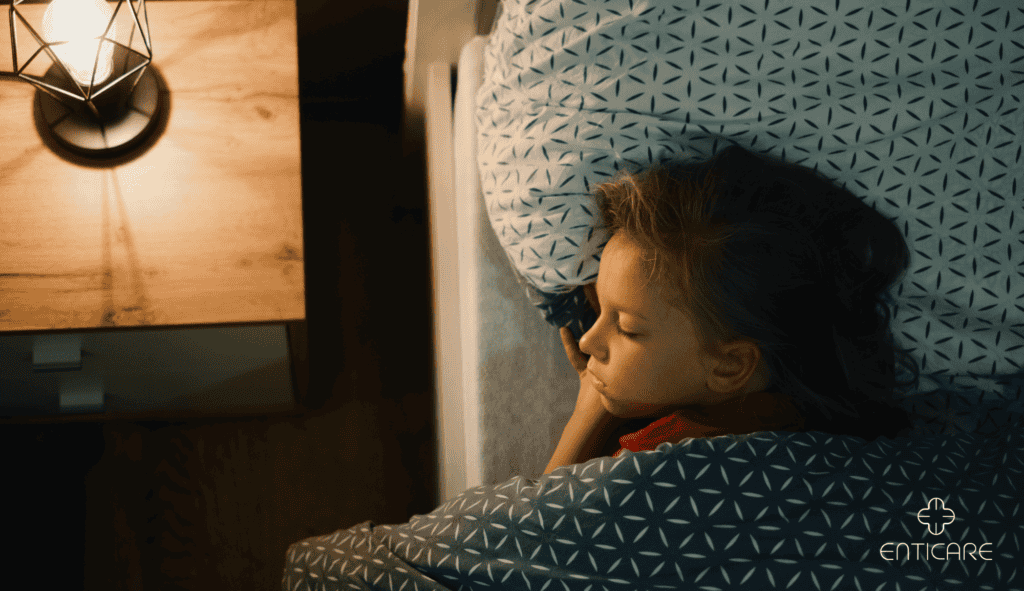Sleep is vital to every child’s health, growth, and development. Pediatric sleep studies are a crucial part of sleep medicine, a field dedicated to diagnosing and treating sleep disorders in children. While sleep disorders affect adults, they also commonly impact children, sometimes leading to challenges like daytime sleepiness, attention issues, and mood changes. Pediatric sleep studies help uncover and address these sleep issues, creating a path for healthier sleep. This blog explores why pediatric sleep studies are essential, what they involve, and how they benefit a child’s well-being.
Sleep Stages and REM Sleep
Children, like adults, experience different stages of sleep, including REM (rapid eye movement) and non-REM sleep. REM sleep is characterized by rapid eye movements, increased brain activity, and vivid dreams. This stage is crucial for brain development and memory consolidation, particularly for children. Non-REM sleep is divided into three phases, with stage 3 being the deepest and most restorative. Children typically spend more time in REM sleep than adults, which supports their cognitive and physical growth. Understanding these stages can help parents appreciate the complexity of their child’s sleep and the importance of each phase.
What Are Pediatric Sleep Studies?

Pediatric sleep studies involve testing that evaluates how well a child sleeps and helps diagnose underlying sleep disorders. Understanding these studies helps parents recognize how they improve children’s lives.
Diagnosing Sleep Disorders in Children
Sleep studies diagnose conditions like sleep apnea, restless leg syndrome, and other disorders that impact children’s sleep. These studies provide valuable data to help medical professionals recommend effective treatments. In some cases, treatments like continuous positive airway pressure (CPAP) may be recommended to help keep airway passages open during sleep.
Tracking Developmental Sleep Stages
Children experience changes in sleep patterns as they grow, and sleep studies help monitor these patterns. These patterns are influenced by the sleep-wake cycle, which is regulated by biological mechanisms such as circadian rhythms and homeostasis. Studies can show whether sleep issues stem from age-related shifts or medical conditions requiring attention.
Identifying Daytime Behavioral Issues
Many daytime behavior problems, like irritability or trouble focusing, are often linked to sleep issues. Sleep studies help pinpoint whether sleep disturbances contribute to these issues, offering a comprehensive view of a child’s health.
Common Signs Your Child May Need a Sleep Study

Recognizing signs of sleep disturbances can help you decide if a pediatric sleep study is necessary. Here are vital signs that may indicate a sleep disorder.
Frequent Snoring or Sleep Apnea During Sleep
Snoring, gasping, or pauses in breathing could signal sleep apnea, a condition that limits airflow during sleep. A sleep study helps detect and address such situations before they cause further health problems.
Difficulty Falling Asleep or Staying Asleep
Sleep disorders often lead to trouble falling asleep, frequent awakenings, or early-morning wakefulness. A sleep study provides insights into what disrupts sleep and helps plan effective treatments.
Daytime Fatigue or Hyperactivity
Sleep-deprived children may show signs of fatigue or hyperactivity, leading to behavioral issues. Recognizing these symptoms early and opting for a sleep study helps understand the root causes and find solutions.
Overnight Observation and Monitoring
Most sleep studies involve an overnight stay at a sleep center. Specialists monitor your child’s breathing, heart rate, brain activity, and movement while they sleep, gathering essential data on sleep quality.
Polysomnography (PSG) Testing
Polysomnography is the primary test used in sleep studies. It measures various factors, including oxygen levels, to determine sleep quality. This test reveals conditions like sleep apnea and helps understand abnormal sleep patterns. Polysomnography is a cornerstone of sleep research. It provides valuable data that helps advance our understanding of sleep disorders and their impact on health.
Comfort Measures for Children
Sleep centers ensure children feel comfortable and secure during the study. Many centers offer child-friendly rooms, comforting objects, and parental presence to make the experience as stress-free as possible.
Benefits of Pediatric Sleep Studies for Your Child’s Health
Pediatric sleep studies offer numerous health benefits, addressing sleep quality, overall well-being, and development.
Improved Cognitive and Emotional Development
Good sleep supports cognitive functions such as memory, problem-solving, and focus. Deep sleep, a critical phase of non-REM sleep, is essential for physical and mental rejuvenation and supports cognitive functions such as memory and problem-solving. Sleep studies help improve cognitive development and emotional health by diagnosing sleep disorders early.
Reduced Risk of Future Health Problems
Untreated sleep issues in children can lead to health complications later, including cardiovascular problems or metabolic issues. By addressing sleep disorders early, parents can reduce these risks significantly.
Better Academic and Social Outcomes
Improving sleep through diagnosis and treatment of sleep issues can enhance academic performance and social interactions. Well-rested children often exhibit better focus, mood regulation, and social engagement.
Available Treatments and How Pediatric Sleep Studies Guide Them

Once a sleep study identifies sleep issues, a doctor can recommend targeted treatments. Understanding these treatment options empowers parents to support their child’s sleep health.
Positive Airway Pressure (PAP) Therapy
PAP therapy for children diagnosed with sleep apnea ensures that air flows smoothly through the airways during sleep. This treatment helps children breathe better, reducing disruptions and improving overall sleep quality.
Behavioral and Lifestyle Adjustments
Behavioral adjustments, such as a consistent bedtime routine, reduce the likelihood of sleep issues. Sleep specialists may also recommend lifestyle changes, such as reducing screen time and increasing physical activity.
Surgical Interventions
For structural issues, such as enlarged tonsils or adenoids, surgery can provide relief from obstructive sleep apnea. Pediatric sleep studies guide this decision by showing whether physical obstructions cause sleep disruption.
Supporting Your Child’s Health with Pediatric Sleep Studies
Pediatric sleep studies give insights that help your child achieve healthier, more restful sleep. These studies uncover hidden sleep issues, paving the way for effective treatments and long-term wellness. If you’ve noticed signs of sleep disturbances in your child, it might be time to consult a specialist.
Schedule an appointment with our team at Enticare to discuss how a sleep study can benefit your child. Quality sleep is crucial for children’s health and development, and we’re here to help.

